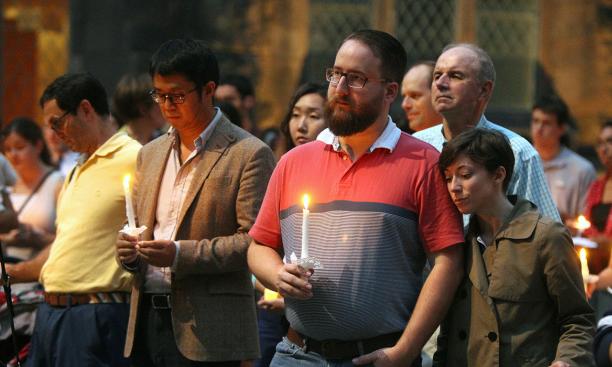
Hundreds of candles were lit as more than 100 colleagues, family, and friends gathered in East Pyne courtyard Sept. 15 for a vigil to support a Princeton graduate student imprisoned in Iran.
Xiyue Wang, a fifth-year graduate student in history, is serving a 10-year prison term after his conviction on two counts of espionage. He was arrested by Iranian authorities in the summer of 2016 as he was completing archival research in Tehran for his dissertation on Eurasian history and has been in custody since then. The University has said that the charges against Wang are “completely false.”
Wang’s wife, Hua Qu, told of how she has dealt with the circumstances, day by day. “During the ups and downs of the past year, my hopes for Xi’s release have been shattered time and time again. Every time I think about him, I have stopped imagining how he spends his days, and how long the next 10 years may mean to my family,” she said. “My husband’s health is deteriorating fast.”

“The U.S. government must help defend the values that attract so many of the world’s brightest minds to its shores,” Qu told the crowd. “Securing the release of my husband would prove a commitment to the freedom of thought, international scholarship, and cultural understanding that Xiyue embodies.”
Several of Wang’s friends and colleagues shared memories of Wang, including his adviser, Professor Stephen Kotkin.
“He was full of warmth and curiosity,” said Fauzia Farooqui, a lecturer with the Program in South Asian Studies who met Wang in 2005, when he was studying Urdu in an intensive language program in India. “He’s not only a brilliant scholar, but a sensitive person,” she said. “And he’s a down-to-earth family guy.”
“He always had time for his family,” added Xue Zhang, a graduate student in East Asian studies. “Every day, after finishing his day of work at Firestone Library, he went home with his kid and cooked dinner for the family. … He soon became the master cook among friends. And he got a nickname: Cook Wang.”
Qu told of her final contact with Wang before he was taken into custody by Iranian authorities.
At 2:20 a.m. on August 7, 2016, she recalled, “I was awakened by my husband’s call from Tehran. Three weeks earlier, police had confiscated his passport and laptop. They questioned him several times, and finally told him that they were sending him to the airport, and that he should leave the country immediately. He planned to purchase a ticket home, and said he would call me back when he arrived at the airport.”
Qu sent a text to Wang, but it went unanswered. She would later learn that his first 18 days in an Iranian prison were spent in solitary confinement.
She recalled the exact spot where she answered his first call from Tehran on the 18th day: in the heart of campus, outside Firestone Library. After she hung up, she looked down, and found these words by Sir Henry Wotton carved into the stone walkway:
How happy is he born and taught
That serveth not another’s will;
Whose armour is his honest thought
And simple truth his utmost skill.
Jane Manners, a graduate student in history, told the gathering that “it’s critical that we continue as a community to be there” for Qu. Supporters have created a group on Facebook: “Free Xiyue Wang.”
